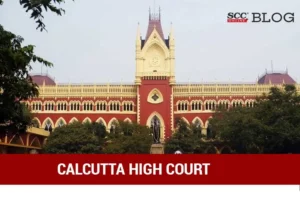Calcutta High Court: In a revisional application challenging the impugned order holding that the application for pre-emption was not barred by limitation, a single-judge bench comprising of Biswaroop Chowdhury,* J., held that the issue of limitation was not raised in lower courts and cannot be entertained for the first time in revision. The Court upheld the Appellate Court’s findings and dismissed the revisional application.
Factual Matrix
In the instant matter, the petitioners are the opposite parties in a case under Sections 8 and 9 of the West Bengal Land Reforms Act, 1955. They are respondents in an appeal before the appellate court, challenging the order of the trial judge. The case revolves around the disputed RS plot no. 1158, which underwent LR operations and was renumbered as 1297. The father of opposite parties initially held a 4 anna share in the plot. In 1984, he gifted 4 decimals to his three sons (opposite parties) and one another. The dispute arises from the subsequent sale of an 8-decimal portion by co-sharer to the petitioners in 1996. The petitioners contested, asserting themselves as bargadars cultivating the land and denying the opposite parties’ right to pre-emption.
The trial court, after considering the evidence, dismissed the case on the grounds that since the co-sharer had sold his entire share to the opposite parties, there was no basis for pre-emption. The Court cited a precedent stating that pre-emption could only be exercised when a co-sharer transfers a portion of their interest.
Aggrieved by the trial court’s decision, the opposite parties filed an appeal before the Additional District Judge. The Appellate Court, vide judgment dated 22-12-2021, allowed the appeal and held that the registration of the sale deed in 1996 was completed in March 2008. The court rejected the petitioner’s contention that the application for pre-emption was barred by limitation.
The petitioners approached this Court, alleging that the Appellate Court erred in holding that the application for pre-emption was not barred by limitation. It was argued that the sale deed was completed in 1996, making the application filed in 2008 time barred.
Moot Point
- Whether Additional District Judge acted illegally and with material irregularity in determining that the application for pre-emption is not barred by limitation?
-
Whether the impugned order, if upheld, would cause irreparable loss and injury to the petitioners?
Parties’ Contentions
The petitioners contended that the sale deed was registered in 1996, making the 2008 application for pre-emption barred by limitation. On the other hand, the opposite parties argued that the registration was completed in 2008, and the plea of limitation is raised to mislead the court.
Court’s Assessment
The Court emphasised that the point of limitation was not raised in the lower courts and was introduced for the first-time during revision. Referring to the Registration Act, the court highlighted the need for compliance with Section 61 for the registration to be considered complete. Citing Bhaguvati Prasad Sah v. Bhaguvati Prasad Sah, (1964) 5 SCR 105, the Court stated that the plea of premature registration was a question of fact that should have been raised earlier.
The Court affirmed the Appellate Court’s finding that the sale deed’s final registration was in 2008, and the application for pre-emption filed in 2008 was within the prescribed period. The court dismissed the revisional application, upholding the Appellate Court’s judgment and finding no ground for interference.
Court’s Decision
The Revisional Application was dismissed, and the judgment of the Appellate Court, dated 22-12-2021, was affirmed. The Court found no merit in the petitioner’s contention that the application for pre-emption was barred by limitation.
[Ajit Kumar Bhunia v. Prabhash Chandra Maity, 2024 SCC OnLine Cal 487, order dated 19-01-2024]
*Judgment by Justice Biswaroop Chowdhury
Advocates who appeared in this case :
Mr. Rabindranath Mahato, Mr. Aritra Shankar Roy, Counsel for Petitioners
Mr. Snehasis Jana, Mr. Sudeep Sanyal, Counsel and Mr. Chandrachur Lahiri, Counsel for the Opposite Parties

